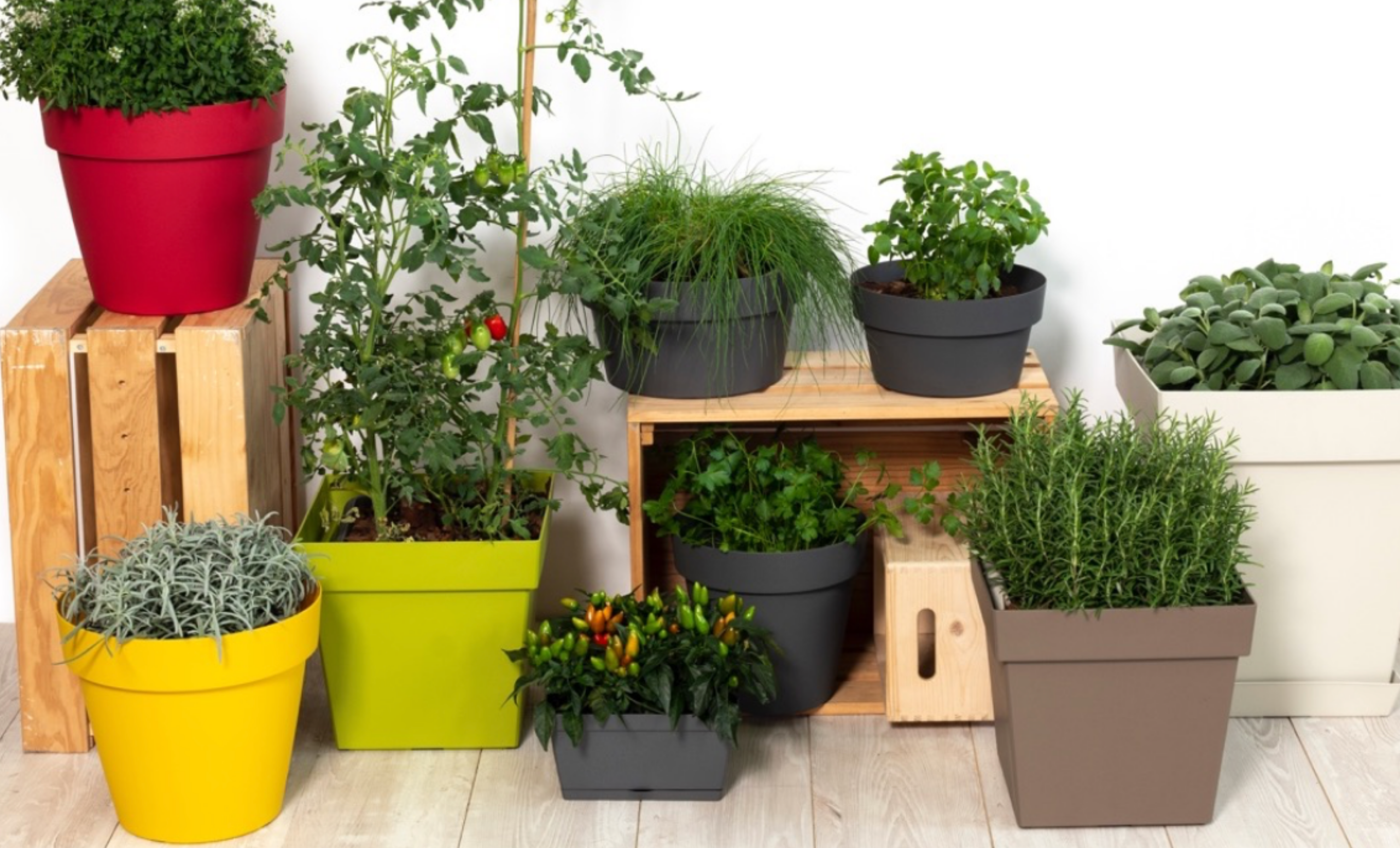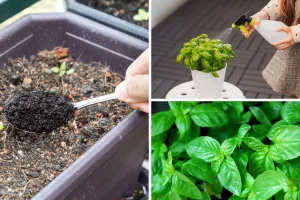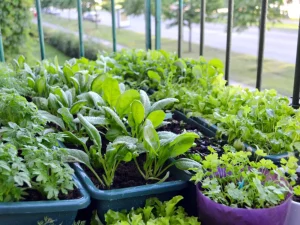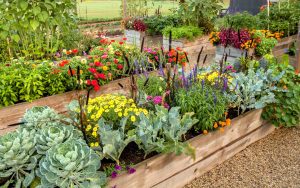Creating a garden can be difficult if you live in the city and don’t have much outdoor space. But a lack of space doesn’t have to stop you from going green. Small space farming, especially organic container gardening, is a great way to solve this problem. This approach not only allows people with limited space to enjoy the benefits of gardening, but also encourages people to do something sustainable and good for the environment. In this complete guide, we’ll learn about small-space gardening, focusing on organic container gardening tips that can transform the smallest porch or windowsill into a lush, blooming garden.
How to Garden in a Small Space?
As the name suggests, small space gardening involves growing plants in a small area. This could be a small veranda, a patio or even a sunny spot indoors. Organic container gardening, a type of growing in small spaces, takes this idea one step further. This means growing plants in pots without the use of synthetic fertilizers or pesticides and promoting natural, long-lasting growth.
How to Choose the Best Container:
When it comes to organic container gardening, the first step is choosing the right pot. Choose pots and containers made from eco-friendly materials, such as clay, wood or recycled plastic. These materials ensure that the roots can breathe and that water can drain. Also take the size of the pot into account. Larger pots usually give plants more room to grow, but herbs and microgreens can grow well in smaller pots.
Choose the Right Plants:
One of the nice things about container gardening is the variety of plants you can choose from. If the area is smaller, focus on plants that grow well in containers. Herbs such as basil, mint and thyme grow well in pots, as do microgreens such as cherry tomatoes, peppers and lettuce. Flowers such as marigolds and petunias not only make your garden look beautiful, but also naturally repel pests.
Organic Soil and Fertilizer:
Soil is very important when it comes to organic container growing. Choose potting soil made from natural materials such as manure and natural fertilizers. These provide plants with the nutrients they need without using dangerous chemicals. Additionally, consider adding organic mulch, such as straw or dry leaves, to keep the soil moist, discourage weed growth and add nutrients to the soil over time.
How to Water Correctly:
Container plants need regular water, but too much water is just as bad as too little. Make sure the container has holes in the bottom so the dirt doesn’t get wet. Give the plant plenty of water, but allow excess water to drain through the holes. Consider purchasing a self-watering container or using a drip irrigation system to keep the soil moist.
Plant together to Repel Pests Naturally:
Use companion plants in container gardens. Some plants have natural properties that repel pests or introduce insects that are beneficial to the plant. For example, you can keep nematodes away from your vegetables by planting marigolds nearby. Basil repels mosquitoes and flies. By growing plants in a certain way, you can create a natural environment that reduces the need for pesticides.
Maintenance and Reduction:
Your container garden needs regular care to stay healthy. Watch for signs of pests or diseases and treat them immediately. Also prune your plants if necessary so that they can grow well. Regular pruning not only gives your plants shape, but also ensures that more air can flow through them, making them less likely to get sick.
Harvest and Maintain Everything:
Buying your own fresh vegetables and herbs is one of the best parts of organic container growing. For the best flavor, pick vegetables when they are ripest. Herbs can be picked more often, making them bushier. Consider composting food scraps and plant waste to create nutrient-rich compost for your garden and help the environment.
Benefits of Organic Container Gardening for Small Spaces:
Environmentally Friendly
Organic container gardening does not use chemicals that are harmful to plants or people. This makes the environment healthier for both plants and people. It reduces carbon emissions by encouraging people to grow their own food and eliminating the need for transportation.
Get the Most Out of Your Space
Even small spaces can be put to good use. Balconies, terraces and even windowsills can be transformed into a lush green paradise. Using vertical garden tools, such as trellises and hanging pots, is another way to make the most of your space.
Healthier Foods
Organic food made at home is fresher and healthier than store-bought organic food. By monitoring how your plants grow, you can ensure that no dangerous chemicals are used, making your food healthier and safer.
Treating and Relieving Stress
People know that gardening can help them feel better. Spending time with plants, caring for them and watching them grow can relieve stress and calm you down, which is good for your mental health.
Interesting and Inspiring
Children in particular can learn a lot from growing in containers. By involving children in gardening, they learn about the climate, how plants grow and why it is important to do things in a sustainable way.
Contribution to Biodiversity
Even if you only have a small room, you can help biodiversity by planting different types of plants. Different plants attract different insects and birds, turning your balcony into a small ecosystem.
Conclusion:
The fact that organic plants can be grown in a small space shows how powerful and flexible nature is. It allows people living in cities to connect closely with the earth, care for living things and enjoy the benefits of homegrown food. By using these tips and following the rules of organic gardening, anyone can transform a small area into a beautiful garden full of life. Whether it’s a few herbs, a cluster of colorful flowers or a few microgreens, growing in any container makes the world a greener, more sustainable place, one pot at a time.
FAQs:
1. What is the best organic fertilizer for container gardening that ensures plant health and is environmentally friendly?
Organic container gardening requires the right fertilizer to thrive. Discover natural options such as compost, worm castings and seaweed extract. These enrich the soil and ensure that your plants grow healthily without harming the environment.
2. How can you effectively control pests in a small organic garden without using chemical pesticides?
Discover natural pest control methods for your container garden. Companion plants, neem oil and diatomaceous earth are effective organic solutions. They deter pests without compromising the organic integrity of your garden.
3. What are the most space-efficient container options for urban gardening to maximize limited balcony or patio space?
Space optimization is the key to small space gardening. Consider vertical gardening with hanging pots, wall-mounted planters and tiered shelves. These creative solutions maximize your space and allow you to grow a variety of plants.
4. Is it possible to grow organic vegetables in containers? If so, what are the best vegetables for small spaces?
Absolute! Compact vegetables such as cherry tomatoes, peppers and herbs thrive in containers. Make sure the soil is fertile and well-drained and choose an appropriately sized pot. With proper care, you can enjoy a bountiful harvest of organic vegetables in a limited space.
5. How can you maintain a sustainable container garden, including composting and reusing materials, to minimize your impact on the environment?
Sustainable container gardening includes recycling and composting. Make compost from kitchen waste, invest in eco-friendly flower pots and consider reusing materials such as wooden crates or barrels. By minimizing waste and reusing resources, you can contribute to a greener planet.



